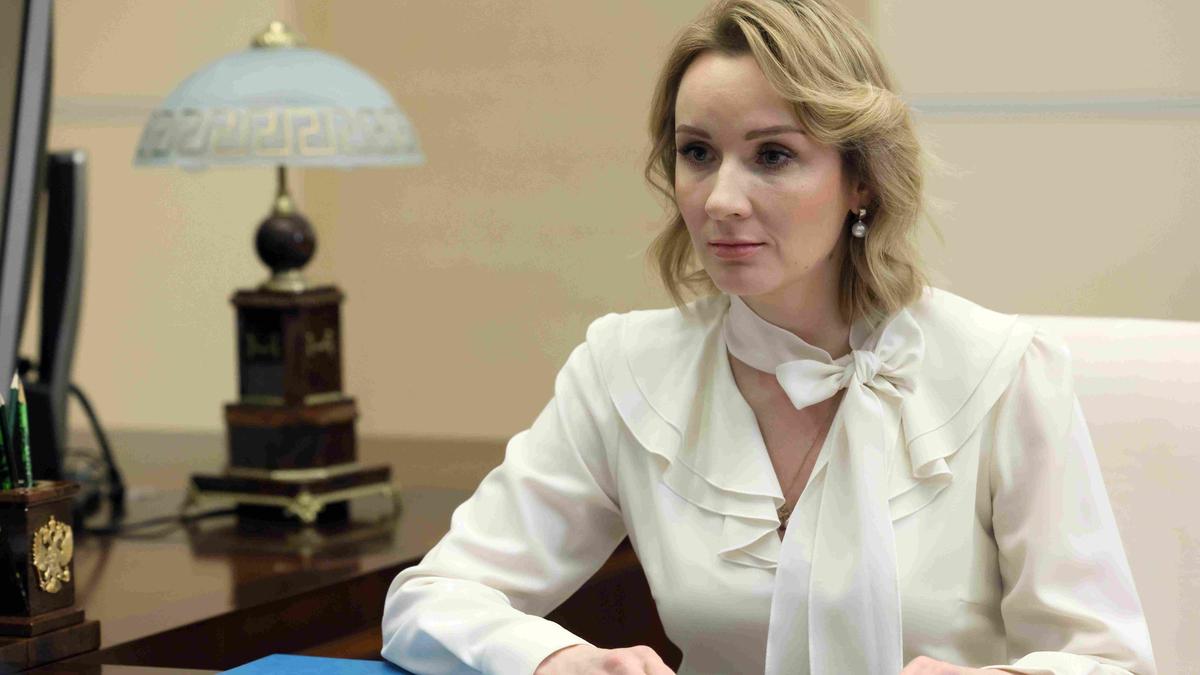Commissioner for Children’s Rights Maria Lvova-Belova could have, like her predecessor and fellow native of Russia’s Penza Anna Kuznetsova, drunk tea with the president for several years and used her own example to show how the country’s birth rate is growing.
But four months after her taking office, war broke out, and she had to take part in what the International Criminal Court classifies as child abduction. She has been reporting publicly on this for a year, so there is now an international warrant for Lvova-Belova’s arrest.
Novaya Gazeta Europe tells the story of Maria Lvova-Belova’s journey from a simple singer in a church choir to an accomplice of Vladimir Putin at the ICC.
The position of Commissioner for Children’s Rights in Russia was established in 2009 by the decree of then-president Dmitry Medvedev. The children’s ombudsperson’s task is to protect children’s rights and independently monitor the activities of state bodies.
The first defender of all Russian children was Pavel Astakhov, a popular Russian lawyer. He stepped down from that position in 2016, in the wake of the tragedy at Lake Syamozero, where 14 children were killed in a poorly organised water camping trip. Arriving at the hospital to see the survivors, the first thing Astakhov asked was: “Well, how was the swim?” He could not get away with this cynicism.
Astakhov was soon replaced by Anna Kuznetsova from the town of Penza, a children’s commissioner who was also a philanthropist, a priest’s wife, and a mother of many children. During her five years in office, she gave birth to her sixth child and launched several memorable initiatives: she demanded that a children’s rhyme about the flu be banned because it referred to “white powder” and suggested that the ruling United Russia party’s logo be changed, adding a family to the lonely bear.
Created as an alternative to “terrible” juvenile justice, the institution of the children’s rights commissioner in Russia has essentially become an extension of the state apparatus to influence the younger generation, but by no means a protection from it. While juvenile justice implies the intervention of a body independent from the state that stands guard over children’s rights in every situation, the Russian children’s rights commissioners fundamentally avoid conflict with the authorities, legitimising any form of state violence against children with the hands of caring people with kind faces.
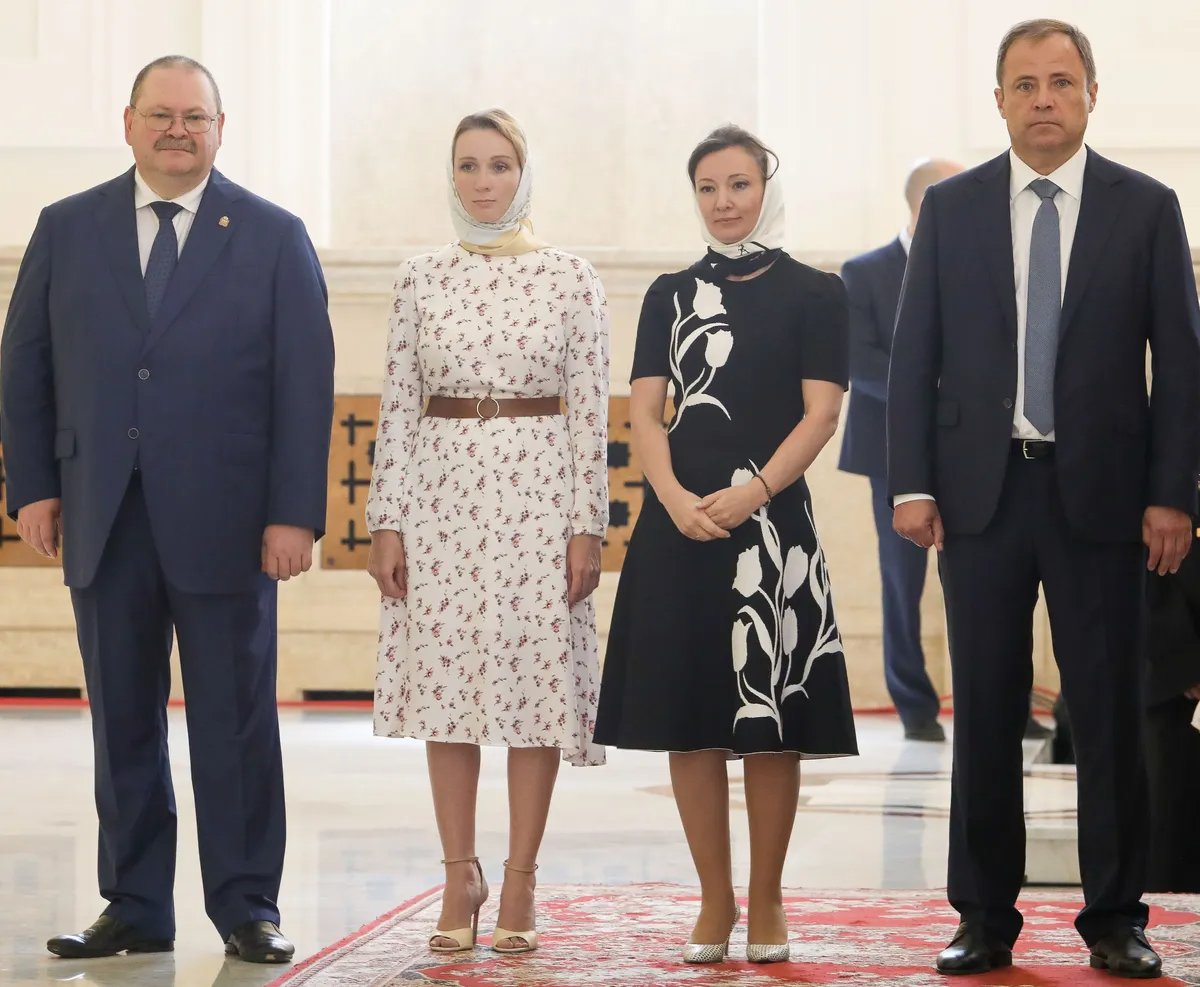
Maria Lvova-Belova (middle left), Anna Kuznetsova (middle right). Photo: Wikimedia Commons, CC BY-SA 4.0
Anna Kuznetsova also spent a lot of time transporting Ukrainian children from Donbas, but before 2022, this activity could be construed as humanitarian aid: the quality of medical care in non-government-controlled territories had dropped dramatically, and parents and caregivers frightened by Russian propaganda were afraid to seek treatment in Ukraine.
In 2021, Kuznetsova became an MP and passed the baton to another Penza mother of many children, a priest’s wife and philanthropist Maria Lvova-Belova, who continued her predecessor’s efforts. However, Lvova-Belova did not take into account that the “special military operation” was a full-scale war, where completely different laws apply.
Maria Lvova-Belova has no pedagogical education. According to official data, she was born in 1984 in Penza and graduated from the A.A. Arkhangelskiy College of Culture and Arts as a bandleader there in 2002.
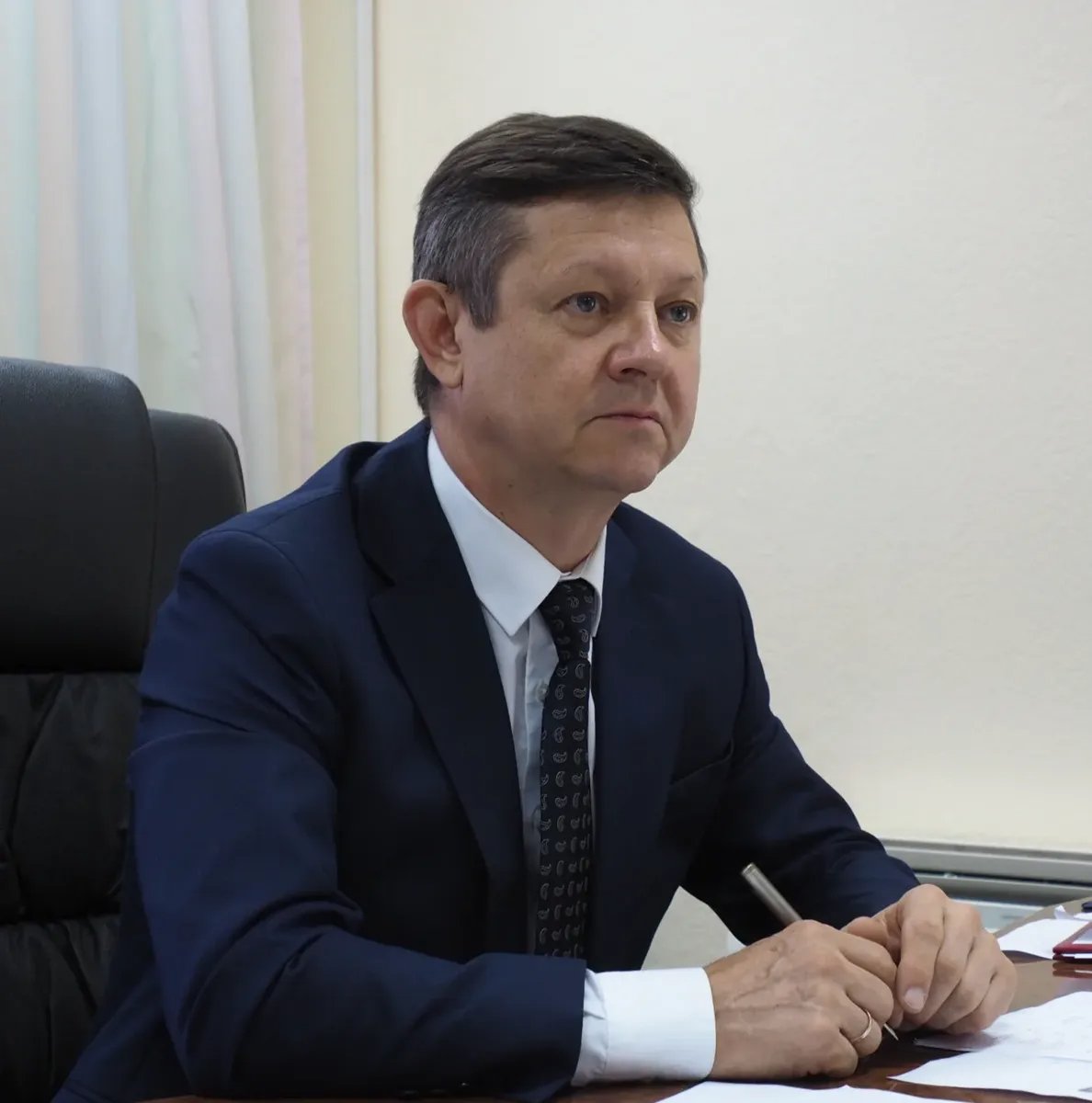
Alexey Lvov-Belov. Photo: Association of Musical Theatres
Her father Alexey Lvov-Belov worked as a teacher for more than 20 years in this college. It is noteworthy that in 2009, just after the start of his daughter’s meteoric rise to prominence, he went on to become a public figure. He first went to work at the Penza Philharmonic and a year later became its director. Then he began organising major music festivals. Since 2020, Alexey Lvov-Belov has been the head of the Krasnodar Opera House.
His daughter, according to various sources, also tried to obtain a higher education in 2003: she enrolled at the Samara Academy of Culture and Arts, but in 2005 she left her studies because she gave birth to her child. Lvova-Belova would later receive a degree in management from Penza Technological University — she was already a public official at that time.
The ombudsperson herself says that she started working at the age of 16 in her second year at the college when she led a guitar workshop. She also sang in the church choir, where she met her husband, Pavel Kogelman.
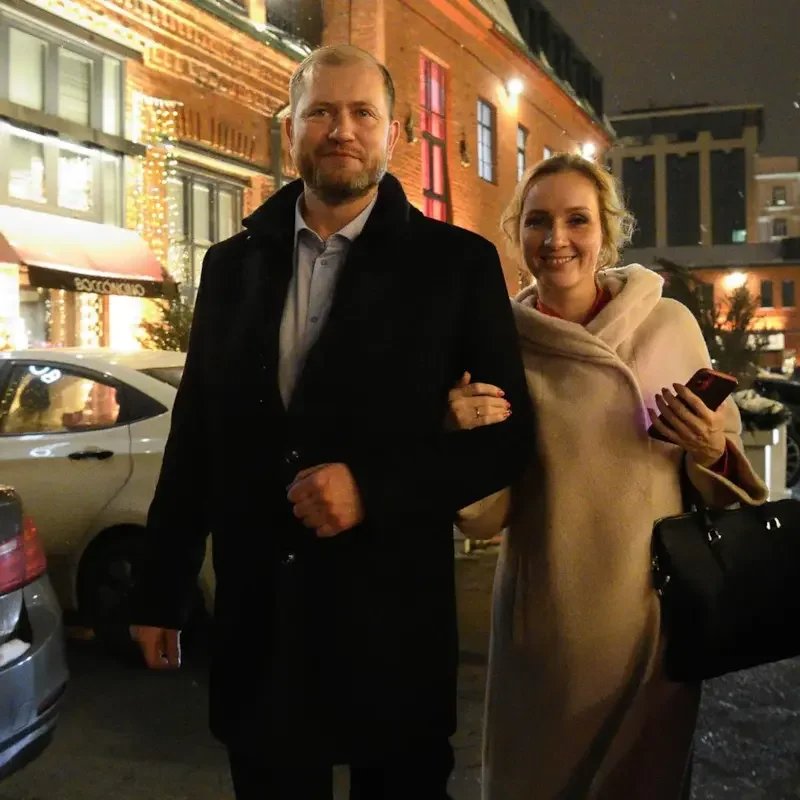
Maria Lvova-Belova and Pavel Kogelman. Photo: Instagram
The couple has five children of their own and 17 adopted children, some of whom have never lived with them: since 2008, Maria and her husband have been involved in charitable projects for the adaptation and socialisation of orphans.
Lvova-Belova’s husband, an IT specialist, was ordained and became a priest in 2019. By this point, there wasn’t a person in Penza who didn’t know about prominent United Russia figure, social activist and philanthropist Maria Lvova-Belova.
“She, her husband, and a few other people started going to orphanages, communicating with orphans, bringing them stuff,” recalls one of the Penza volunteers familiar with the activities of both commissioners. “She and Kuznetsova started out together. Then each went her own way. Kuznetsova was the first to join the party (United Russia), and the first to leave Penza. As for Lvova-Belova, it was not clear how she managed to do everything so smoothly. OK, the first house she allocated for disabled housing was her family’s house. But then everything went like clockwork. Land and finances were easily found. They really stood out against other charities, as if they had no problems at all.”
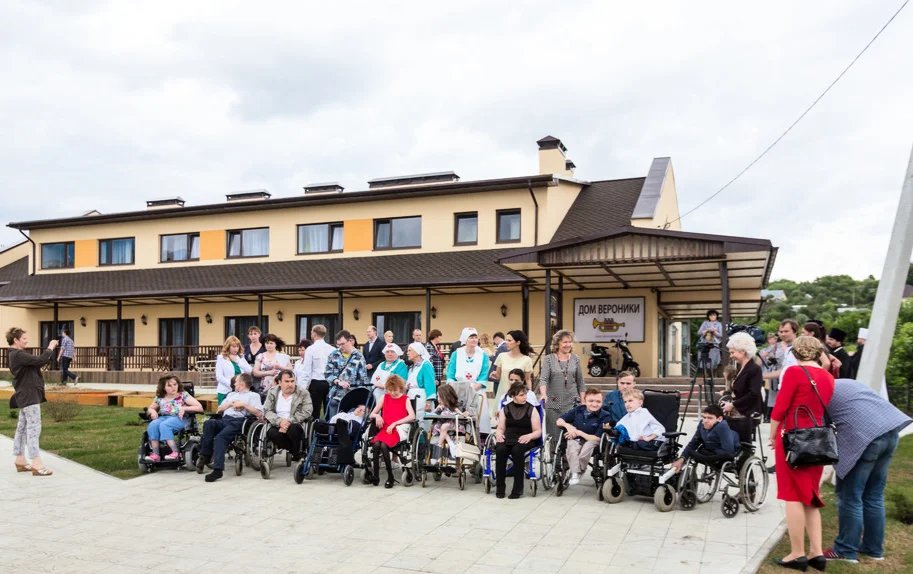
The opening of the Veronica House guesthouse for people with disabilities. Photo: Louis’ Quarter
The project in question is Louis’ Quarter, a commune where young people with disabilities learn to live independently under the supervision of professionals. It started in 2008 with the establishment of the Penza charity organisation Blagovest. Lvova-Belova together with her helpers supported families with many children and orphanages. They organised foster care for social orphans and abandoned children. And all this with the money they raised.
The intense public activity and public relations efforts bore fruit: in 2011, Lvova-Belova became a member of the Public Chamber of Penza, and in 2014 she opened the Louis’ Quarter. The premises for the first flats, workers, and art spaces were allocated by the Penza Diocese. Numerous sponsors paid for the repairs and equipment.
The main trustees of Louis’ Quarter are the Presidential Grants Foundation and the Russian Orthodox Church. According to official figures, each year Louis’ Quarter (named after the musician Louis Armstrong — a tribute to the founder’s musical past) provides assistance to 600 young people, who are given the opportunity to live in normal conditions, develop and even work instead of being locked up in a mental institution.
The launch and implementation of the Louis Quarter are linked to the United Russia party project, which was launched in 2013 at the suggestion of Sergey Neverov, a United Russia member, and was called “Every Child Matters to Russia”. The project was designed to improve the system of adoption and adaptation of orphans and children with disabilities but was essentially Russia’s response to the global criticism of the Dima Yakovlev Law. Also called the “law of the scoundrels,” it bans citizens of “unfriendly countries” from adopting Russian children, including children with disabilities, who were mostly taken in by foreigners.
According to official figures, the Louis’ Quarter exists solely on charitable donations and government grants. Critics of Maria Lvova-Belova say she “does charity work at public expense”.
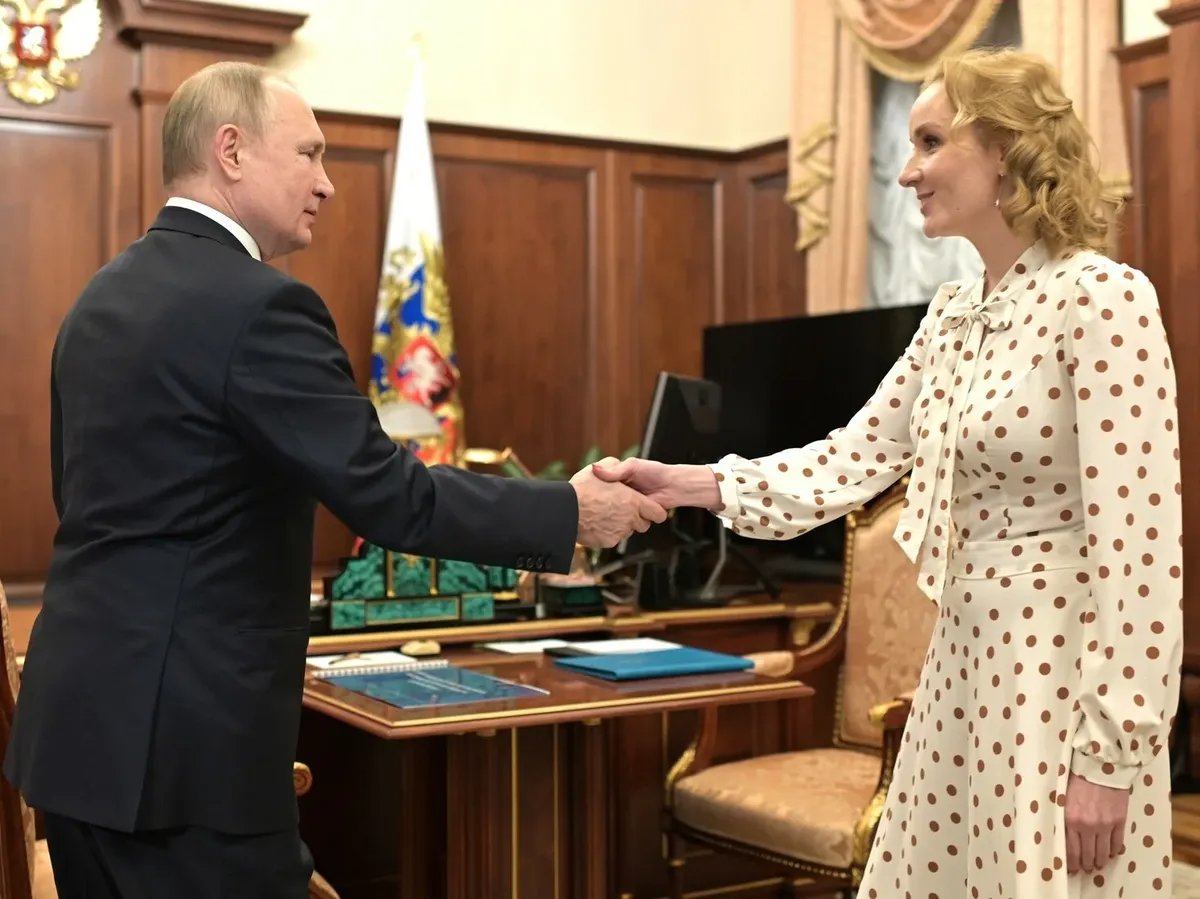
Vladimir Putin and Maria Lvova-Belova. Photo: Wikimedia Commons, CC BY 4.0
By Russian standards, Lvova-Belova’s career has really turned out to be amazing: in 2019, the future children’s rights commissioner becomes a member of the Russian Civic Chamber, and in 2020, having barely obtained a management degree, she becomes a senator representing the Penza region.
The war with Ukraine presented the young woman with a difficult choice. Acting as a children’s rights advocate, in line with international conventions during the war, Lvova-Belova was to support the evacuation and subsequent handover of children from the occupied territories to the Ukrainian side. Instead, the Russian side began to place Ukrainian children in Russian orphanages and foster families, and to conduct what was essentially forced Russification — with the active support of the children’s rights commissioner.
Speaking at a meeting of the Civic Chamber in September 2022, Lvova-Belova said that orphans from Mariupol were “taught to love Russia” in their new families. She was quoted by BBC News Russian.
Her speech was about 30 children who were “found in basements” in Mariupol. At the time, they had a “sharply negative” view of Russia. “When we brought them to the Moscow region to recover a little bit, they started speaking negatively about President [Putin], said all sorts of nasty things, sang the Ukrainian anthem, ‘Glory to Ukraine!’ and all that,” the commissioner said.
However, she added, after the children were placed with foster families, Ukrainian children’s attitudes towards Russia changed dramatically. “We started asking the kids: ‘You say Russia is bad. All right, let Russia be bad, you have an opportunity to go back now,’” the commissioner recounted a conversation with young Ukrainians. “None of the children wanted to go back, they all said: ‘We are very happy here.’ So yes, there is some negativity, maybe in the beginning, but then it transforms into love for Russia.”
The commissioner herself also could not resist taking in a child from Mariupol, which she told President Putin about.
Putin: You adopted a child from Mariupol, right?
Lvova-Belova: Yes, thanks to you.
Putin: A little kid?
Lvova-Belova: No, he is 15 years old. Now I know what it is like to be a mother of a child from Donbas — it is difficult, but we love each other for sure.
Putin: That’s the most important thing.
Lvova-Belova: It is. I think we will manage everything, won’t we?
Putin: Of course.
The official website of the children’s rights advocate mostly features reports on how Maria Lvova-Belova travels around Russian cities, meets with local bureaucrats, and opens so-called “teen support centres” at government expense.
And then in March, it became known that the International Criminal Court had issued arrest warrants for her and Russian President Vladimir Putin.
They are accused of the war crime of illegally deporting children from the occupied territories. The exact number of victims is unknown: Ukraine initially claimed 300,000 children had disappeared. The Russian authorities treated the removal of children as evacuation, offering a much higher figure — 750,000.
The office of Ukrainian Commissioner for Children’s Rights Darya Herasymchuk has detailed information on 16,000 cases of children being removed from Ukrainian territory, with several hundred children already returned.
The Conflict Observatory research agency says it knows of at least six thousand Ukrainian children who have been brought to Russia and adopted there since the beginning of the war.
“Ms Maria Alekseyevna Lvova-Belova, born on 25 October 1984, Commissioner for Children’s Rights in the Office of the President of the Russian Federation, is allegedly responsible for the war crime of unlawful deportation of population (children) and that of unlawful transfer of population (children) from occupied areas of Ukraine to the Russian Federation (under articles 8(2)(a)(vii) and 8(2)(b)(viii) of the Rome Statute). The crimes were allegedly committed in Ukrainian occupied territory at least from 24 February 2022,” reads the warrant of the International Criminal Court issued on 22 February 2022.
A total of 52 people have been indicted by the ICC since it was officially established in 2002. They are mostly political figures and war criminals from Africa, Asia, the Philippines, and Venezuela.
Lvova-Belova is not the only female suspect at the ICC. In November 2012, a court issued an arrest warrant for Simone Ehivet Gbagbo, a prominent politician and wife of Côte d’Ivoire president. The mother of five daughters was suspected of involvement in so-called death squads in 2011, when her husband, the country’s former president, failed to get re-elected, and this triggered a wave of violence in Côte d’Ivoire.
The ICC demanded Simone Gbagbo’s extradition, but the country’s authorities refused. The former first lady received 20 years in prison but was pardoned by Côte d’Ivoire’s new authorities three years later. In 2021, the International Criminal Court acquitted Simone Gbagbo of all charges.
Делайте «Новую» вместе с нами!
В России введена военная цензура. Независимая журналистика под запретом. В этих условиях делать расследования из России и о России становится не просто сложнее, но и опаснее. Но мы продолжаем работу, потому что знаем, что наши читатели остаются свободными людьми. «Новая газета Европа» отчитывается только перед вами и зависит только от вас. Помогите нам оставаться антидотом от диктатуры — поддержите нас деньгами.
By clicking the Support button, you agree to the processing of your personal data.
To cancel a regular donation, please write to [email protected]
